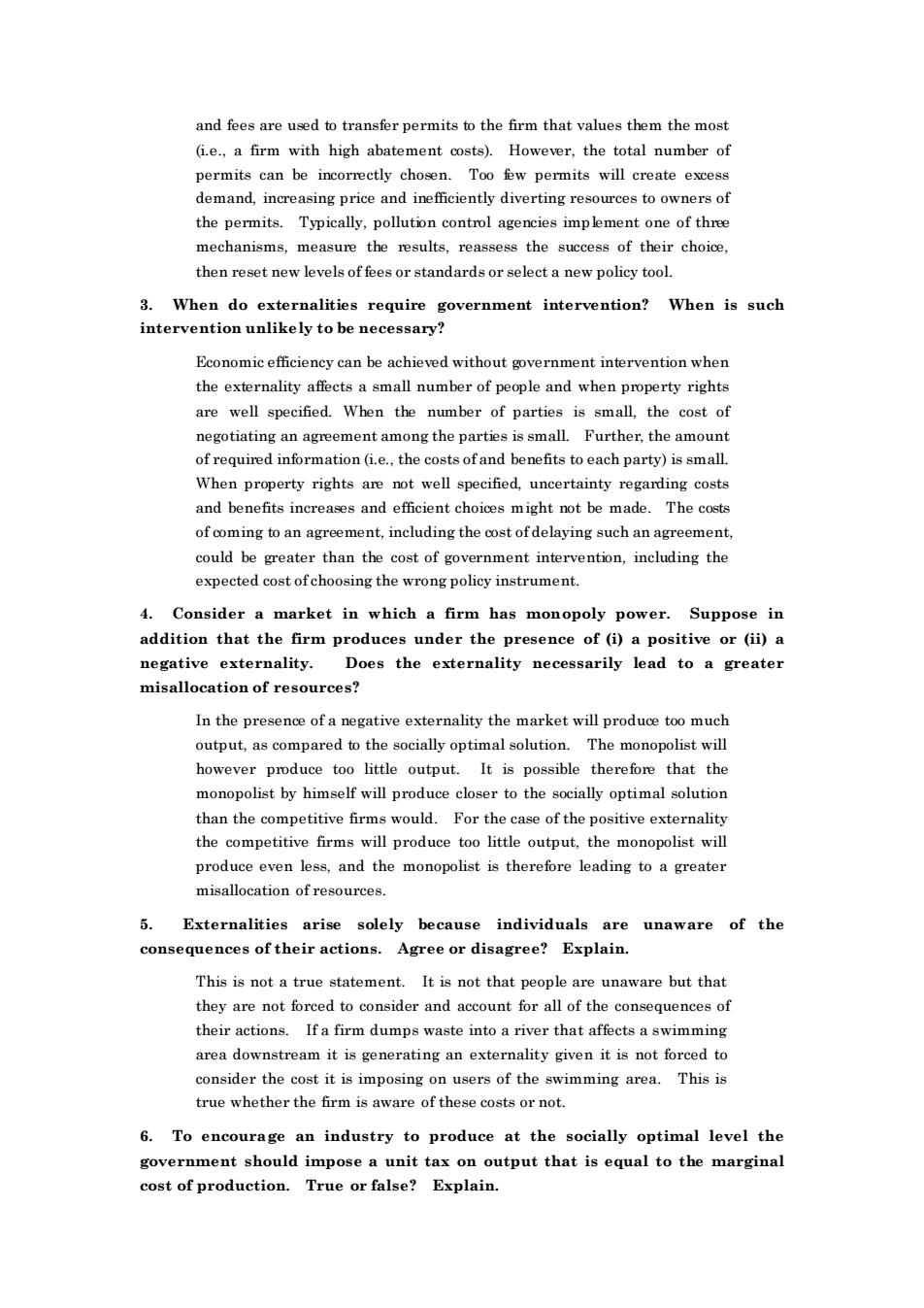正在加载图片...

and fees are used to transfer permits to the firm that values them the most (i.e.a firm with high abatement costs).However,the total number of permits can be incorrectly chosen. Too w permits will create exces demand,increasing price and inefficiently diverting resources to owners of the permits.Tvpically.pollution control agencies implement one of thre mechanisms.measure the results,reassess the success of their choice. then reset new levels of fees or standardsor select a new policy tool 3.When do externalities require government intervention?When is such intervention unlikely to be necessary? Economic efficiency can be achieved without vernment intervention whe the externality affects a small number of people and when property rights are well specified.When the number of parties is small.the cost of negotiating an agreement among the parties is small.Further.the amount of required information the benefts toeach party)ismall Whe property rights ar uncertainty costs and benefits increases and efficient choices might not be made. The cost of coming to an agreement,including the cost ofdelaving such an agreement could be greater than the cost of government intervention,including the expected cost ofchoosing the wrong policy instrument. 4.Consider a market in which a firm has monopoly power.Suppose in ddition that the firm produces under the presence of (i)a positive or (ii)a negative externality. Does the externality necessarily lead to a greater misallocation of resources? In the presence of a negative externality the market will produce too much output,as compared to the socially optimal solution.The monopolist will however produce too little output.It is possible therefore that the monopolist by himself will produce closer to the socially optimal soution than the competitive firms would For the case of the positive externalit the competitive firms will produce too little output,the monopolist will produce even less,and the monopolist is therefore leading to a greater misallocation of resources. Externalities arise solely because individuals are unaware of the ons equences of their actions.Agree or disagree?Explain. This is not a true statement.It is not that people are unaware but that they are not forced to consider and account for all of th e consequences o their actions.If a firm dumps waste into a river that affects a swimming area downstream it is generating an externality given it is not forced to consider the cost it is imposing on users of the swimming area.This is true whether the firm is aware of these costs or not. 6.To encourage an industry to produce at the socially optimal level the government sh ould impose a uni t tax on output that is equal to the margina cost of production.True or false?Explain. and fees are used to transfer permits to the firm that values them the most (i.e., a firm with high abatement costs). However, the total number of permits can be incorrectly chosen. Too few permits will create excess demand, increasing price and inefficiently diverting resources to owners of the permits. Typically, pollution control agencies implement one of three mechanisms, measure the results, reassess the success of their choice, then reset new levels of fees or standards or select a new policy tool. 3. When do externalities require government intervention? When is such intervention unlikely to be necessary? Economic efficiency can be achieved without government intervention when the externality affects a small number of people and when property rights are well specified. When the number of parties is small, the cost of negotiating an agreement among the parties is small. Further, the amount of required information (i.e., the costs of and benefits to each party) is small. When property rights are not well specified, uncertainty regarding costs and benefits increases and efficient choices might not be made. The costs of coming to an agreement, including the cost of delaying such an agreement, could be greater than the cost of government intervention, including the expected cost of choosing the wrong policy instrument. 4. Consider a market in which a firm has monopoly power. Suppose in addition that the firm produces under the presence of (i) a positive or (ii) a negative externality. Does the externality necessarily lead to a greater misallocation of resources? In the presence of a negative externality the market will produce too much output, as compared to the socially optimal solution. The monopolist will however produce too little output. It is possible therefore that the monopolist by himself will produce closer to the socially optimal solution than the competitive firms would. For the case of the positive externality the competitive firms will produce too little output, the monopolist will produce even less, and the monopolist is therefore leading to a greater misallocation of resources. 5. Externalities arise solely because individuals are unaware of the consequences of their actions. Agree or disagree? Explain. This is not a true statement. It is not that people are unaware but that they are not forced to consider and account for all of the consequences of their actions. If a firm dumps waste into a river that affects a swimming area downstream it is generating an externality given it is not forced to consider the cost it is imposing on users of the swimming area. This is true whether the firm is aware of these costs or not. 6. To encourage an industry to produce at the socially optimal level the government should impose a unit tax on output that is equal to the marginal cost of production. True or false? Explain